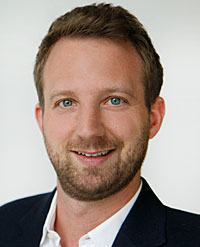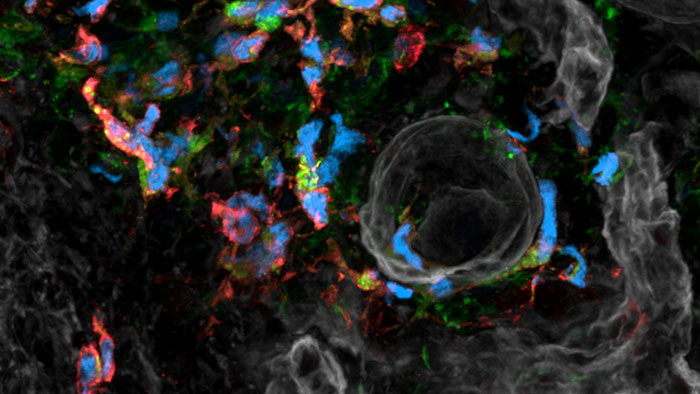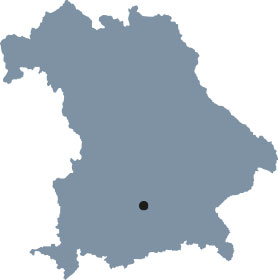Local immune control of cancer
Our immune system is able to detect and eliminate cancer cells. Novel therapeutic strategies aim to harness the immune system’s potential to fight cancer and show remarkable success in the clinic. However, advanced cancers have often developed mechanisms to evade detection and destruction by the immune system, and the majority of patients fail to respond to current immunotherapies. The International Junior Research Group led by Dr. Jan P. Böttcher aims to understand the molecular mechanisms that impair anti-tumor immunity in order to develop new strategies for immune control of cancer.
| Place of research | Munich |
| Association | International Doctorate Program „i-Target: Immunotargeting of cancer“ |
| Project duration | 2018 to 2023 |
| Group leader | Dr. Jan P. Böttcher Contact the group leader |
| Further information | Website of the Institute of Molecular Immunology and Experimental Oncology |
Harnessing the immune system for cancer therapy
Cancer encompasses a plethora of neoplastic diseases that severely affects - and often threatens - the life of many people around the globe. According to current estimates by the World Health Organization, more than 32 million people are currently living with cancer, and almost every second person alive today will be diagnosed with cancer during his or her lifetime.
While the research and the development of cancer therapies has led to a significant improvement of survival for many types of cancer, half of the people diagnosed with cancer still succumb to their disease within ten years.
It is now well established cancer cells can be detected and attacked by our immune system. Discoveries in basic research on the regulation of the immune system have revolutionized the way we think about the treatment of cancer, culminating in the award of the 2018 Nobel Prize in Physiology or Medicine to James P. Allison and Tasuku Honjo for their discovery of the immune inhibitory receptors CTLA-4 and PD-1 in the regulation of anti-cancer immunity.


The structure of the research group and its association with the doctorate program i-Target provides an ideal environment for our young team to perform cutting edge research and to successfully address our research questions on cancer immune control.
Dr. Jan P. Böttcher
This research has led to the development of promising immunotherapies that target cells of the immune system to fight cancer, such as Immune Checkpoint Inhibition and CAR T cell therapies.
Immune Checkpoint Inhibitors have shown remarkable success for the treatment of advanced cancer, leading to unprecedented, long-lasting remission and potential cure in a fraction of patients.
Investigating immune control of cancer

Cancer cells have often developed mechanism to evade detection and destruction by the immune system in order to grow, which limits spontaneous anti-cancer immunity and the success of current immunotherapies. The group led by Dr. Jan Böttcher uses modern imaging techniques and bioinformatic analyses of cancer patient data to decipher the mechanisms that control anti-tumor immunity on a systemic level and locally within tumors and their surrounding microenvironment.
Major aims of the group are to identify and understand molecular mechanisms that could be targeted therapeutically to treat cancer, including the pathways that regulate the access of innate and adaptive immune cells into tumours, the initiation and modulation of immune cell phenotypes and the local communication between immune cells within tumor tissue.
The International Junior Research Group cooperates with the International Graduate School „i-Target: Immunotargeting of cancer“ of the Ludwig-Maximilians-Universität of Munich, the Technical University of Munich and University of Erlangen-Nuremberg.
Further cooperations
| Helmholtz Zentrum Munich | Munich, Germany |
| Max Planck Institute of Biochemistry | Martinsried, Germany |
| Wakayama Medical University | Wakayama, Japan |
| The Francis Crick Institute | London, United Kingdom |
| The University of Manchester | Manchester, United Kingdom |
| University College London | London, United Kingdom |


